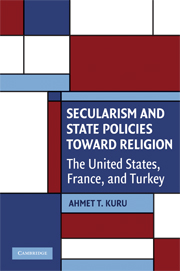Book contents
- Frontmatter
- Contents
- List of Figures and Tables
- Glossary of Abbreviations
- Acknowledgments
- Secularism and State Policies toward Religion
- Introduction
- 1 Analyzing Secularism
- PART I THE UNITED STATES
- PART II FRANCE
- PART III TURKEY
- Conclusion
- Appendix A State-Religion Regimes Index of 197 Countries
- Appendix B Human Development and Official Religion in 176 Countries
- Appendix C State-Religion Regimes in Forty-Six Muslim Countries
- Appendix D Turkey's National Security Council Decisions, February 28, 1997
- Bibliography
- Index
Appendix D - Turkey's National Security Council Decisions, February 28, 1997
Published online by Cambridge University Press: 05 June 2012
- Frontmatter
- Contents
- List of Figures and Tables
- Glossary of Abbreviations
- Acknowledgments
- Secularism and State Policies toward Religion
- Introduction
- 1 Analyzing Secularism
- PART I THE UNITED STATES
- PART II FRANCE
- PART III TURKEY
- Conclusion
- Appendix A State-Religion Regimes Index of 197 Countries
- Appendix B Human Development and Official Religion in 176 Countries
- Appendix C State-Religion Regimes in Forty-Six Muslim Countries
- Appendix D Turkey's National Security Council Decisions, February 28, 1997
- Bibliography
- Index
Summary
(1) There shall be no compromise to the antiregime activities that target the Turkish Republic, which is a democratic, secular, social, and law-based state. The Revolution Laws defended by article 174 of the constitution should be implemented without a compromise. It is the government's duty to make its policies compatible with the Revolution Laws.
(2) The public attorneys should act against violation of the Revolution Laws. The tariqa lodges that violate the Revolution Laws should be closed down.
(3) It is observed that wearing sarık (turban) and cloak is encouraged. Those whose dresses contradict the Revolution Laws should not be honored.
(4) The abolishment of article 163 of the constitution created a legal vacuum, and that resulted in the strengthening of reactionary movements and antisecular attitudes. There should be new legal regulations to fill this vacuum.
(5) The education policies should again be compatible with the spirit of the Law on the Unification of Education.
(6) Obligatory education should increase to eight years.
(7) The Imam-Hatip schools were open to satisfy a societal need [of imams]. The Imam-Hatip schools that are beyond this need should be converted to vocational schools. Additionally, the reactionary groups' Qur'an courses should be closed down, and their schools should be regulated by the ministry of education.
(8) There is an ongoing fundamentalist infiltration into the state bureaucracy and municipalities. The government should stop this infiltration.
[…]
- Type
- Chapter
- Information
- Secularism and State Policies toward ReligionThe United States, France, and Turkey, pp. 261 - 262Publisher: Cambridge University PressPrint publication year: 2009



